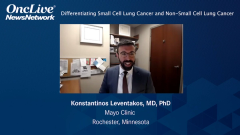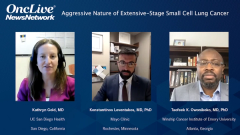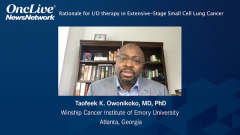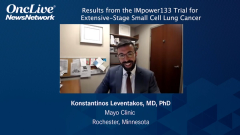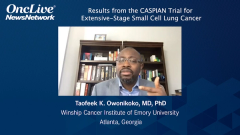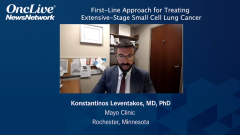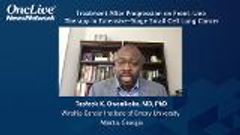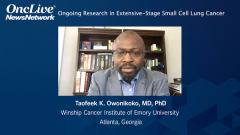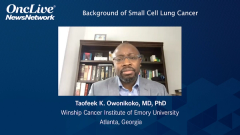
Results from the IMpower133 Trial for Extensive-Stage Small Cell Lung Cancer
Episodes in this series

Kathryn Gold, MD: You both mentioned a few trials. Let’s get into some of their specifics. Let’s talk about the IMpower133 trial with carboplatin, etoposide, and atezolizumab. Could you please go over the study design and the results from that trial?
Konstantinos Leventakos, MD, PhD: This is the first trial that made us all familiar with the combination of chemotherapy and immunotherapy. It was a double-blind, placebo-controlled phase 3 trial that compared carboplatin/etoposide with carboplatin/etoposide/atezolizumab. There were 4 cycles of the combination of chemotherapy and immunotherapy, followed with atezolizumab maintenance or placebo. When we had the first publication, there was a median follow-up of 13.9 months, and at this time, the overall survival was 12.3 months in the atezolizumab group vs 10.3 months in the placebo group. The hazard ratio for that was 0.7. The median progression-free survival in the same study was 5.2 months vs 4.3 months. The AUC [area under the curve] of carboplatin in this trial was 5 mg/mL/min, and they were including only treated brain metastases at this point.
That was amazing data for all of us, and they were confirmed by the update given by the investigator in 2019. Then, we had the median follow-up of about 23 months. The median overall survival remained the same, 12.3 vs 10.3 months. The hazard ratio was 0.76, and 13% more patients were alive in the atezolizumab group in both 12 and 18 months. Most recently, in ESMO [European Society for Medical Oncology] Virtual Congress 2020, we had a presentation of the characterization of the long-term survival, and there were more long-term survivals defined as surviving more than 18 months in the atezolizumab group compared with the placebo group. This is something that has to do with the discussion about immunotherapy. When they looked into the prognostic value of PD-L1 or TMB tumor mutation burden, they could not identify that. Even patients with a bad characteristic disease could be long-term survivors.
Kathryn Gold, MD: That was the first large trial that was presented for extensive-stage small cell lung cancer with the combination of chemotherapy and immunotherapy.
Transcript Edited for Clarity


